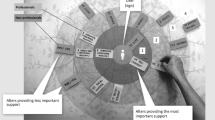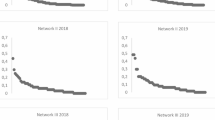Abstract
The community support network has beenwell-established as a requirement for communitytreatment of individuals with severe mental disorders.This network generally consists of a multidisciplinaryset of organizations that interrelate in some mannerwith individuals in the community. The question ofcoordination within this network has been muchdiscussed; however little published research hasempirically examined the types and extent of coordinationamong network organizations. In particular, littleattention has been given to community support networksin rural communities. In each of seven rural counties, information was obtained on interactions amongorganizations in the community support network. Thesenetworks were analyzed to yield information on networkdensity and centralization. Using measures of centrality, the most central organizations ineach network were identified. Exchanges of informationwere the most common type of interaction amongorganizations in each network. Client referrals occurred less frequently, and sharing of resources wasan even rarer phenomenon. Network analysis of communitysupport networks provides an objective perspective onthe structure of community support networks. An understanding of exchange among organizationswithin these networks is of value to administrators,clinicians, and planners interested in achieving greatereffectiveness, as well as to patients, their families, and advocacy groups concerned with access andquality of care.
Similar content being viewed by others
REFERENCES
Aiken, L.; Somers, S. & Shore, M. "Private foundations in health affairs: A case study of the development of a national initiative for the chronically mentally ill." American Psychologist41: 1290–1295, 1987.
Bolland, J.M. & Wilson, J.V. The Local Aging Network: Final Report of the Madison County Elder Services Project. Tuscaloosa: Institute for Social Science Research, University of Alabama, 1989.
Bonacich, P. "Factoring and weighting approaches to status scores and clique identification." Journal of Mathematical Sociology,2: 113–120, 1972.
Borgatti, S.; Everett, M.K. & Freeman, L.C. UCINET IV, Version 1.0 Reference Manual,Columbia: Analytic Technologies, 1992.
Fox, J.; Merwin, E. & Blank, M. "De facto mental health services in the rural south." Journal of Health Care for the Poor and Underserved6(4): 434–468, 1995.
Freeman, P. "Centrality in social networks: Conceptual clarification." Social Networks,1: 215–239, 1979.
Heflinger, C. Final report of Fort Bragg Evaluation: The Implementation Study. Unpublished manuscript. Nashville: Vanderbilt University Center for Mental Health Policy, 1993.
Johnsen, M.C.; Morrissey, J.P.; Calloway, M.O.; Fried, B.J.; Blank, M. & Starrett, B.E. "Rural mental health leaders’ perceptions of stigma and community issues." Journal of Rural Health(in press), 1996.
McGuirk, M.A. & Porell, F.W. "Spatial patterns of hospital utilization: The impact of distance and time." Inquiry21: 84–95, 1984.
Morrissey, J.P. "An interorganizational approach to evaluating children’s mental health services. " In Evaluating Mental Health Services for Children,L. Bickman & D. Rog (eds.). San Francisco: Jossey-Bass, 1992.
Morrissey, J.P.; Ridgely, M.S.; Goldman, H.H. & Bartko, W.T. "Assessment of community mental health support systems: A key informant approach." Community Mental Health Journal30(6): 565–579. 1994.
Morrissey, J.P.; Tausig, M. & Lindsey, M. Network analysis methods for mental health service system research: A comparison of two community support systems. NIMH Series BN No. 6, DHHS Pub. No. (ADM) 85-1383. Washington, D.C.: Government Printing Office, 1985.
Provan, K.G. & Milward, H.B. "A Preliminary Theory of Interorganizational Network Effectiveness: A Comparative Study of Four Community Mental Health Systems." Administrative Science Quarterly40: 1–33, 1995.
Scott, J. Social Network Analysis: A Handbook. London: Sage, 1991.
Shannon, G.W.; Bashshur, R.L. & Metzner, C.A. "The concept of distance as a factor in the accessibility and utilization of health care." Medical Care Review26(1): 143–161, 1969.
Shore, M. & Cohen, M. "Creating new systems of care: The Robert Wood Johnson Foundation Program on Chronic Mental Illness." Hospital and Community Psychiatry 41(11): 1212–1216, 1990.
Turner, J. & TenHoor, W. "The NIMH community support program: Pilot approach to a needed social reform." Schizophrenia Bulletin4(3): 319–408, 1978.
Wagenfeld, M.O.; Murray, J.D.; Mohatt, D.F. & DeBruyn, J.C. Mental Health and Rural America: 1980-1993. Washington, DC: Office of Rural Health Policy, HRSA; Office of Mental Health Research NIMH; US DHHS, PHS, 1995.
Rights and permissions
About this article
Cite this article
Fried, B.J., Johnsen, M.C., Starrett, B.E. et al. An Empirical Assessment of Rural Community Support Networks for Individuals with Severe Mental Disorders. Community Ment Health J 34, 39–56 (1998). https://doi.org/10.1023/A:1018712212309
Issue Date:
DOI: https://doi.org/10.1023/A:1018712212309




